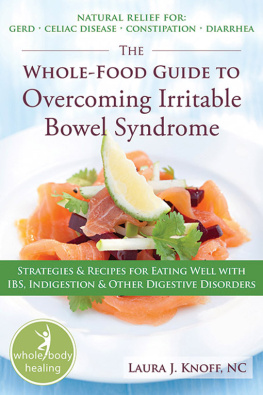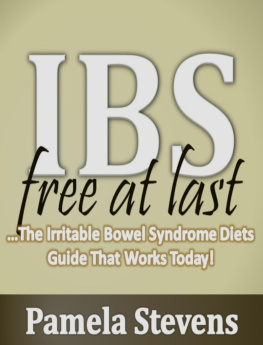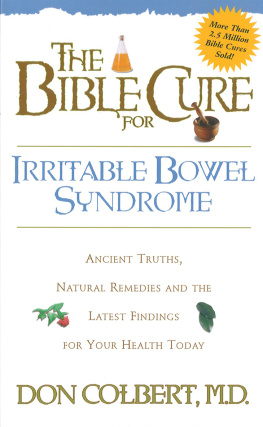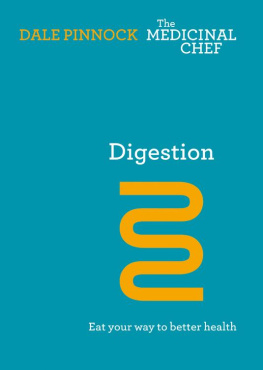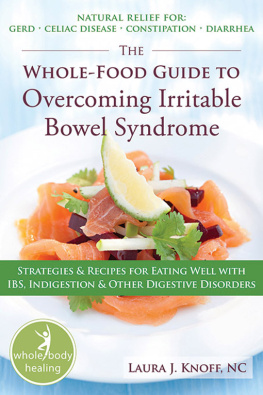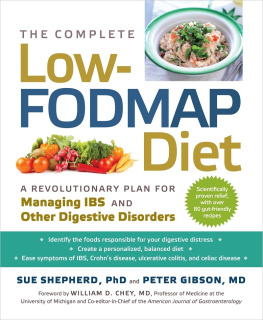Acknowledgments and Dedication
I wish to thank my parents for nurturing my curiosity and problem-solving abilities, my editors, mentors, teachers, clients, and students who are also my teachers. I especially want to thank my Diana, who has supplied unwavering support in so many ways.

Laura J. Knoff, NC, has been studying nutrition and biochemistry since 1975 and earned her nutrition consultant, nutrition educator, diet counselor, and nutrition instructor certificates from Bauman College in Penngrove, CA. She was a senior research associate at Lawrence Berkeley National Laboratory for eight years. She is now a registered professional member of the National Association of Nutritional Professionals and is board certified in holistic nutrition by that organization. She healed her own digestive disorders using whole foods, relaxation, and moderate exercise. Since 2000, she has taught prospective nutrition consultants at Bauman College in Berkeley, CA, and has a private practice at the Labrys Healthcare Circle in Oakland, CA.
Chapter 1
Name It and Claim It
Irritable bowel syndrome (IBS), sometimes called spastic colon or nervous indigestion, is one of twenty-five functional gastrointestinal disorders (Olden 1996). It can be severe enough to prevent you from working or leaving home, lest a toilet be too far away. Defined by its symptoms after other possible causes are eliminated, IBS is characterized as: abdominal pain or cramping relieved by a bowel movement; changes in bowel habits; stool urgency; diarrhea, constipation, or both; and gas and bloating in the absence of detectable structural abnormalities or other causes (Bolen 2009). Many of the symptoms of IBS also apply to inflammatory bowel disease (IBD), celiac disease, and cancer, so its important to consult a medical doctor to rule out these serious diseases (Collins 1994).
Possible Causes and Missed Diagnoses
The most often overlooked cause of IBS, celiac disease is an inherited sensitivity to gluten, the protein in wheat and other cereal grains. Celiac disease is an extreme enough autoimmune disease to potentially destroy the intestinal lining. Two studies showed that 10 percent of participants with IBS had celiac disease (Shahbazkhani et al. 2003; Sanders et al. 2001). Doctors use antibody testing of blood and saliva samples to diagnose celiac disease, and genetic testing (by mouth swab) can determine if you are predisposed to it, even if you no longer consume gluten.
Doctors gold standard for diagnosing celiac disease is to use a biopsy to look for damage to the small intestine. But since the intestine can heal itself in a matter of months, if you didnt consume gluten at all for several weeks prior to the biopsy, you could get false-negative results. A false negative means that little or no damage was found. Some doctors still believe there must be total destruction of the villi of the small intestine to diagnose celiac disease, but newer data shows that even partial villi destruction indicates celiac disease (OBryan 2008).
When you are trying to overcome IBS, you need to ask whats irritating your gut. The answer could be nearly anything, from various food allergens or chemicals to an imbalance of gut flora to hormone and neurotransmitter imbalances (Talley 2006). The same substances that cause the intestine to spasm and quickly eliminate the bowels contents can sometimes lead to more serious conditions if the cause is not addressed, or if drugs or laxatives, which thwart the bodys protective and self-healing mechanisms, are used.
The problem with IBS is that the actual cause of the symptoms may be overlooked or downplayed as stress, or you might even hear your doctor say something like, Its all in your head. Many people with real but undetected causes of abdominal discomfort have been given antidepressants or tranquilizers to reduce their pain (Waxman 1988). The key word is undetected. As we get better at finding a cause for this type of irritation, its likely that there will be fewer IBS diagnoses. In many of my clients, a specialized stool test not only shows the presence of pathogenic or imbalanced bacteria in the gut (also known as dysbiosis), but also indicates how well the digestive system is working (Goldberg, Trivieri, and Anderson 2002). Specialized laboratories test for antibodies to specific pathogens and can indicate which treatments are most effective (see the for a list of laboratories). Colonoscopy, or endoscopic examination of the colon, shows only structural issues, not microscopic changes or bacterial infection. Once the pathogen is eliminated or the imbalance corrected, the gut can heal, and IBS symptoms can disappear.
Its becoming well known that people with IBD, such as Crohns disease or ulcerative colitis, often also have IBS. The difference between IBS and IBD is that people with IBD have detectable structural abnormalities (Collins 1994). I think of IBS as one of the first steps on the continuum of dysfunctional digestion. IBS may also be just one symptom of a life out of balance. IBS affects the whole body and mind, and vice versa.
Not knowing when they will need a toilet can cause many IBS sufferers to restrict their activities considerably. The inability to feel comfortable in your own body can be depressing and anxiety producing. When you cant rely on your digestion, what can you rely on? Food can become the enemy. You may find it easier to eat little, since many symptoms are reduced or eliminated when the digestive system isnt called on to do any work. Some foods may not cause symptoms for a while, but, due to overconsumption, may start triggering symptoms later, further narrowing the variety of foods you can eat.
When something irritates another part of our body, we avoid it. We can physically move away from and avoid a skin irritant. We can wash away bacteria and irritating chemicals, such as paint or poison oak sap. We can avoid insects or swat them away to protect our skin. Similarly, we can eliminate an irritant from the digestive tract; the body uses sudden diarrhea (and sometimes vomiting) to get rid of the toxic irritants excreted by some pathogenic bacteria, such as those involved in food poisoning. Some other microbial toxins (like those produced by Clostridium difficile) directly alter the rate of bowel movement less violently (Joneja 2004). If the body succeeds at eliminating the pathogen, theres no resulting infection, since the intestinal contents are actually part of the exterior environment, not part of our tissues.
Unfortunately, though, we may not be able to directly identify the digestive tract irritant, because it may be from something we consumed days before, or it may relate to something we breathe (chemical exposure) or even to the hormones we produce during stress, monthly cycles, or both. We cant avoid an irritant we cant identify, so we keep coming in contact with it. And just as a continuous skin irritation can lead to inflammation and disease of the skin, the same applies to an ongoing irritation of the internal skin of the digestive system. Continuing to eat foods or substances that cause reactions, and that our bowels then try to reject, may eventually make us tolerate those foodsbut damage continues to occur. If we ignore the warning signs, the unchecked causes can eventually lead to damage and a more severe diagnosis.
The key to keeping food from becoming the enemy, it turns out, is to vary your diet every day on a four-day rotation plan. Ill show you how to identify and avoid your trigger foods, and help you set up a rotation diet to prevent your body from reacting to replacement foods.

